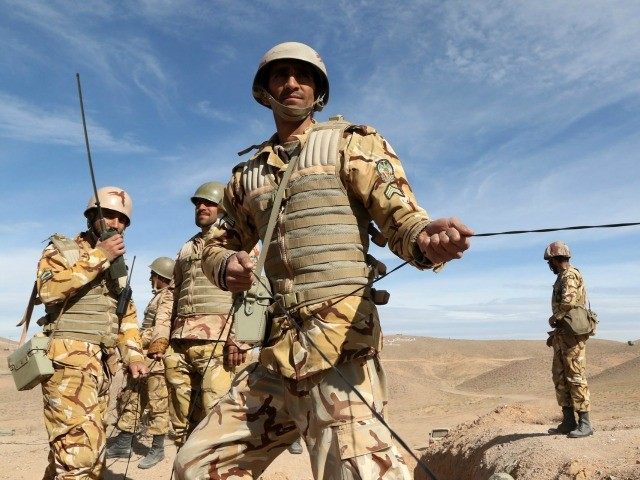America’s United Nations Ambassador Nikki Haley told reporters Wednesday that, while she supported peace talks for all sides of the Syrian civil war, the United States believed it imperative to “get Iran and their proxies” out of the country to maintain longstanding peace.
“The United States absolutely supports [UN special envoy on Syria] Staffan de Mistura and the work that he’s doing,” she told reporters, referring to the announcement of a new round of peace talks. “We support the U.N. process, we support the talks in Geneva, we want to see them continue.”
Haley added, however, that a peaceful political solution would require both Sunni groups like the Islamic State and Shiite groups like Hezbollah to leave Syria. “This is very much about a political solution now… and that basically means that Syria can no longer be a safe haven for terrorists, we’ve got to make sure we get Iran and their proxies out,” Haley said. “We’ve got to make sure that, as we move forward, we’re securing the borders for our allies as well.”
Iran and Russia are the most prominent international allies of Syrian dictator Bashar al-Assad, who has eagerly welcomed their aid in crushing Syrian rebel opposition in areas like Aleppo, where the Islamic State never established itself. As of November 2016, Iranian officials estimated that over one thousand Iranian Shiite troops had died fighting for Assad. Reports at the time indicated that as many as 3,000 fighters allied with Assad in Syria were either Iranian fighters or allied with Iran. Assad also enjoys support from the Shiite terrorist group Hezbollah, which cooperates closely with the Iranian government.
Iran has also deployed its Revolutionary Guard Corps (IRGC) to aid Syrian troops, who have benefitted from protecting Assad with lucrative business investment deals throughout the parts of the country Assad still controls.
In addition to its official presence in Syria and that of its terrorist proxy Hezbollah, Iran has forced Afghan refugees and Pakistani recruits to join the Syrian army in eradicating elements of the anti-Assad opposition, to the tune of an estimated 25,000 Shiite fighters as of November.
The United States has repeatedly objected to Assad’s stance against rebels in the Syrian war, as well as Iran’s and Russia’s involvement. Last year, then-President Barack Obama warned that all three countries had “blood on their hands” following the siege and reconquest of Aleppo, a key victory for Assad in the Syrian Civil War. The Obama administration did little to intervene, however, establishing a failed militia of “vetted” Syrian rebels and failing to challenge Assad on his alleged use of chemical weapons.
In addition to Haley’s challenge to Iran at the United Nations, the Trump administration announced this week that up to 400 Marines would enter the fray outside Raqqa, the “capital” of the Islamic State caliphate. The Marines are expected to use artillery guns to open the way for anti-ISIS Syrian Defense Forces (SDF) troops, a coalition of Kurdish and Arabic militias.
Meanwhile, de Mistura continues to work to schedule a fifth round of peace talks between Damascus and some elements of the Syrian opposition. “My current intention is to bring the invitees back to Geneva for a fifth round, with a target date of the 23rd of March,” he told reporters Wednesday. While multiple Arab opposition groups will participate, terrorist groups like ISIS and Al-Qaeda are not invited.
Another round of “peace talks” may begin a week earlier, as the nation of Kazakhstan announced a second summit of nations involved in the Syrian fray. Russia, Iran, Assad government representatives, Jordan, the United States, and Turkey are expected to participate, as they did during the first Astana talks. “The guarantor countries expect that the Syrian government and the armed opposition groups will confirm their delegations’ participation in the gathering,” Astana announced in a statement.
The United States did not participate officially in the first Astana talks, sending the American ambassador to Kazakhstan instead of an official envoy. Iranian officials made clear they did not approve of the United States having a seat at the table. “We are against their presence,” Iranian Foreign Minister Mohammed Javad Zarif said in January. President Hassan Rouhani also condemned the United States in veiled terms, speaking of “some countries” excluded from the talks as being “destructive” and “helping the terrorists.”
At the behest of Turkey, Syrian Kurdish militias who cooperate with the United States were also left out of the Astana talks.

COMMENTS
Please let us know if you're having issues with commenting.